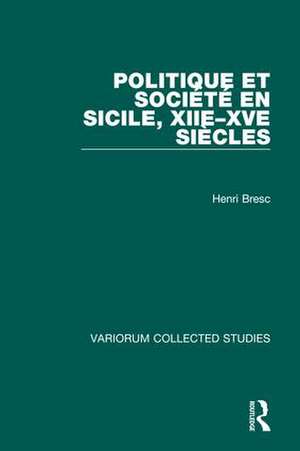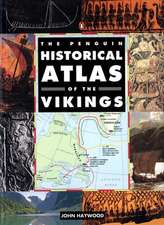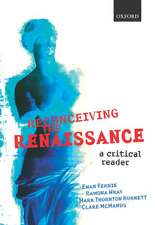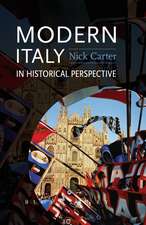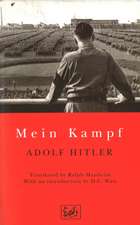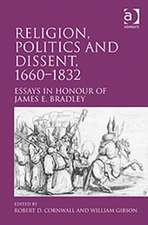Politique et Société en Sicile, XIIe-XVe Siécles: Variorum Collected Studies
Autor Henri Brescen Limba Engleză Hardback – 14 feb 1991
Din seria Variorum Collected Studies
- 9%
 Preț: 938.85 lei
Preț: 938.85 lei -
 Preț: 311.41 lei
Preț: 311.41 lei -
 Preț: 351.48 lei
Preț: 351.48 lei -
 Preț: 313.38 lei
Preț: 313.38 lei -
 Preț: 386.77 lei
Preț: 386.77 lei -
 Preț: 325.68 lei
Preț: 325.68 lei -
 Preț: 396.00 lei
Preț: 396.00 lei -
 Preț: 312.75 lei
Preț: 312.75 lei - 9%
 Preț: 1041.23 lei
Preț: 1041.23 lei -
 Preț: 258.66 lei
Preț: 258.66 lei -
 Preț: 299.55 lei
Preț: 299.55 lei - 9%
 Preț: 938.08 lei
Preț: 938.08 lei -
 Preț: 343.33 lei
Preț: 343.33 lei -
 Preț: 311.18 lei
Preț: 311.18 lei - 9%
 Preț: 937.13 lei
Preț: 937.13 lei -
 Preț: 351.41 lei
Preț: 351.41 lei -
 Preț: 320.00 lei
Preț: 320.00 lei - 34%
 Preț: 764.20 lei
Preț: 764.20 lei - 23%
 Preț: 315.48 lei
Preț: 315.48 lei - 36%
 Preț: 740.06 lei
Preț: 740.06 lei - 34%
 Preț: 764.20 lei
Preț: 764.20 lei - 34%
 Preț: 680.73 lei
Preț: 680.73 lei - 26%
 Preț: 247.40 lei
Preț: 247.40 lei - 34%
 Preț: 485.78 lei
Preț: 485.78 lei - 38%
 Preț: 766.91 lei
Preț: 766.91 lei - 34%
 Preț: 767.07 lei
Preț: 767.07 lei - 34%
 Preț: 764.20 lei
Preț: 764.20 lei - 34%
 Preț: 769.51 lei
Preț: 769.51 lei - 38%
 Preț: 769.85 lei
Preț: 769.85 lei - 34%
 Preț: 826.68 lei
Preț: 826.68 lei - 25%
 Preț: 225.28 lei
Preț: 225.28 lei - 25%
 Preț: 225.54 lei
Preț: 225.54 lei - 34%
 Preț: 736.38 lei
Preț: 736.38 lei - 34%
 Preț: 738.43 lei
Preț: 738.43 lei - 25%
 Preț: 226.52 lei
Preț: 226.52 lei - 33%
 Preț: 491.66 lei
Preț: 491.66 lei - 34%
 Preț: 485.78 lei
Preț: 485.78 lei - 34%
 Preț: 485.78 lei
Preț: 485.78 lei - 36%
 Preț: 739.17 lei
Preț: 739.17 lei - 38%
 Preț: 766.34 lei
Preț: 766.34 lei - 31%
 Preț: 473.94 lei
Preț: 473.94 lei - 18%
 Preț: 843.61 lei
Preț: 843.61 lei - 38%
 Preț: 774.91 lei
Preț: 774.91 lei - 38%
 Preț: 769.92 lei
Preț: 769.92 lei - 34%
 Preț: 764.20 lei
Preț: 764.20 lei - 51%
 Preț: 485.78 lei
Preț: 485.78 lei - 36%
 Preț: 488.49 lei
Preț: 488.49 lei - 34%
 Preț: 769.10 lei
Preț: 769.10 lei - 38%
 Preț: 766.99 lei
Preț: 766.99 lei - 18%
 Preț: 1019.01 lei
Preț: 1019.01 lei
Preț: 222.32 lei
Preț vechi: 298.22 lei
-25% Nou
Puncte Express: 333
Preț estimativ în valută:
42.54€ • 44.54$ • 35.20£
42.54€ • 44.54$ • 35.20£
Carte tipărită la comandă
Livrare economică 05-19 aprilie
Preluare comenzi: 021 569.72.76
Specificații
ISBN-13: 9780860782858
ISBN-10: 0860782859
Pagini: 328
Dimensiuni: 150 x 224 x 22 mm
Greutate: 0.45 kg
Ediția:1
Editura: Taylor & Francis
Colecția Routledge
Seria Variorum Collected Studies
Locul publicării:Oxford, United Kingdom
ISBN-10: 0860782859
Pagini: 328
Dimensiuni: 150 x 224 x 22 mm
Greutate: 0.45 kg
Ediția:1
Editura: Taylor & Francis
Colecția Routledge
Seria Variorum Collected Studies
Locul publicării:Oxford, United Kingdom
Public țintă
Academic and PostgraduateCuprins
Contents: Préface; La formazione del popolo siciliano; Mudéjars des pays de la couronne d 'Aragon et sarrasins de la Sicile normande: le problème de l'acculturation; Féodalité coloniale en terre d'Islam: la Sicile (1070-1240); 1282: classes sociales et révolution nationale; Pour une histoire des Albanais en Sicile XIVe-XVe siècles; Les jardins de Palerme (1290-1460); La chasse en Sicile (XIIe-XVe siècles); 'In ruga que arabice dicitur zucac...': les rues de Palerme (1070-1460); Pantelleria entre l'Islam et chrétienté; Il notariato nella società siciliana medioevale: a coures méditerranéenne au miroir sicilien (XIIe- XVe siècles); Un comté pour les pauvres (Modica, 1337); Ventimiglia et Centelles; Index.
Descriere
In the 12th century, under its Norman rulers, Sicily stood as one of the most flourishing regions of the Mediterranean; by the late 15th century it had sunk into the state of semi-colonial depression and dependence that has chartacterized so much of its modern history. It is this transformation - a process of socio-economic change that went hand in hand with political turmoil - that forms the subject of this volume. Henri Bresc approaches this both from the viewpoint of particular topics, such as the notarial class or the tiny island of Pantelleria, and that of larger themes. One of these is the composition of Sicily's population. These articles trace the deteriorating status of the Arabs and Greeks on the island, the demographic circumstances that brought in new immigrants (notably Albanians, but also corsairs), and the emergence of a society now dominated by its Latin and Italian components. Other articles contrast the intensive suburban agriculture with the empty spaces of the large estates, and throw light on the development of a new landowning structure, based on these estates which were given over to cereals, grown for export in order to meet the financial demands of the long conflict with the Angevins.
